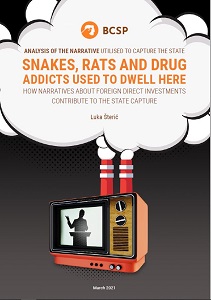ANALYSIS OF THE NARRATIVE UTILISED TO CAPTURE THE STATE: Snakes, Rats and Drug-Addicts used to dwell here: How narratives about foreign direct investments contribute to the state capture
ANALYSIS OF THE NARRATIVE UTILISED TO CAPTURE THE STATE: Snakes, Rats and Drug-Addicts used to dwell here: How narratives about foreign direct investments contribute to the state capture
Author(s): Luka Šterić
Subject(s): Politics / Political Sciences, Politics, Economic policy
Published by: BCBP Beogradski centar za bezbednosnu politiku
Summary/Abstract: Foreign direct investments are the cornerstone of the current government’s economic policy. In their statements, the officials call them drivers of development, saying that they have enabled the revival of the economy and turned Serbia into the “economic tiger of Southeast Europe.”1 The fact that the value of the investments Serbia has managed to attract is greater “than what was achieved by all the countries of the Western Balkans put together” 2 is often mentioned as the key measure of success. However, the story of brilliant success quickly loses its lustre when one considers the long-term effects and all-encompassing consequences of this policy. Due to the way they are contracted and implemented, foreign direct investments represent one of the key mechanisms for capturing the state. Hiding behind the stories of a better future and new jobs, the government is breaking down the system of legal regulations and statutory procedures, promoting private interest to the detriment of the public one, and using foreign investments as propaganda ammunition to legitimise unlimited power. The results of such policy are a number of negative consequences for the state and the citizens, such as the increase of public debt, dramatic violation of workers’ rights and alarming problems with environmental pollution. In order to mask the negative consequences and legitimise the policy of attracting foreign investors based on the above described pattern, a complex narrative has been developed presenting foreign investments as a successful, and the only possible, model for state development. This meta-narrative about progress, which media are building up every day, is based on four basic component narratives: on the economic revival, on the efficiency of personal rule, on transparent contracts and on the opponents of Serbia’s development who ‘unfoundedly’ criticise the government’s economic success. In the analysis of the narrative we will focus on the statements of officials made since2012, which is when the regime led by the Serbian Progressive Party came to power. Many of the described mechanisms, such as non-transparent, harmful contracts and unjustifiably high subsidies, also existed during the previous government.3 However, the capture of the state, carried out - among other things - with the help of foreign direct investments, has reached completely new dimensions under the current regime, while the narratives that accompany it have been significantly ‘improved’.
Series: Beogradski Centar za Bezbednosnu Politiku - POLICY PAPERS
- Page Count: 22
- Publication Year: 2021
- Language: English
- Content File-PDF

